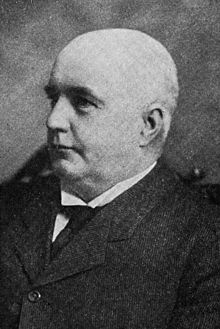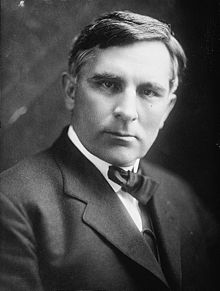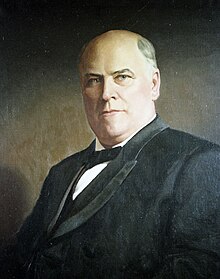General assembly election
Members of the North Carolina General Assembly of 1899–1900Democratic Party return to majority status in both houses, replacing the fusion of Republicans and Populists . After this election, Democrats dominated state politics for the next seventy-plus years, in part due to the 1899–1900 legislature disfranchising African-Americans.[ 2] [ 3] Wilmington massacre .
House of Representatives
House leadership
House members
Rep. Francis D. Winston Rep. Locke Craig Rep. Lee Slater Overman The 118 House of Representative members and their party affiliation are listed below:[ 3] [ 4]
Senate
Senate leadership
Lieutenant Governor Charles A. Reynolds
Senate members
Sen. Robert Broadnax Glenn Senators and their home county are listed below:[ 3] [ 6]
District 1: George Cowper of Hertford; T. G. Skinner of Perquimans
District 2: I. W. Miller of Pamlico; H. S. Ward of Washington
District 3: W. E. Harris of Northampton
District 4: Edward L. Travis of Halifax
District 5: R. H. Speight of Edgecombe
District 6: F. G. James of Pitt
District 7: T. S. Collie Nash; R. A. P. Cooley of Nash
District 8: James A. Bryan of Craven; John Q. Jackson of Lenoir
District 9: Frank A. Daniels of Wayne; Isham F. Hill of Duplin
District 10: W. J. Davis of Brunswick
District 11: Thomas O. Fuller of Warren
District 12: F. A. Whitaker of Wake (Dem)
District 13: J. A. T. Jones of Johnston
District 14: J. W. S. Robinson of Sampson; Frank P. Jones of Harnett
District 15: Joseph A. Brown of Columbus; Stephen McIntyre of Robeson
District 16: W. L. Williams of Cumberland
District 17: Archibald A. Hicks of Granville
District 18: Thomas M. Cheek of Orange; J. M. Satterfield of Caswell
District 19: J. A. Goodwin of Chatham
District 20: William Lindsay of Rockingham
District 21: John N. Wilson of Guilford
District 22: J. C. Black of Moore
District 23: Thomas J. Jerome of Union; Charles Stanback of Montgomery
District 24: R. L. Smith of Stanly (Dem)
District 25: Frank I. Osborne of Mecklenburg
District 26: Robert Broadnax Glenn of Forsyth (Dem); John C. Thomas of Davidson
District 27: James A. Butler of Iredell; Frank C. Hairston of Davie
District 28: J. C. Newsom of Stokes
District 29: H. T. Campbell of Alexander
District 30: William C. Fields of Ashe
District 31: W. L. Lambert of Mitchell; G. G. Eaves of McDowell
District 32: M. H. Justice of Rutherford; Oscar F. Mason of Gaston
District 33: William J. Cocke of Buncombe; Thomas J. Murray of Madison
District 34: J. A. Franks of Swain
District 35: Joel L. Crisp of Graham
See also
References
^ a b The North Carolina Manual, published by the North Carolina Secretary of State , lists both Smith and Whitaker as President pro tempore for 1899–1900. Whether this means that they alternated in the post or that Smith resigned and was succeeded by Whitaker mid-session is unknown.
^ "The North Carolina Election of 1898" . The North Carolina Collection . The University of North Carolina Libraries. Archived from the original on April 27, 2009. Retrieved December 14, 2011 .^ a b c Connor, R.D.D. (1913). A Manual of North Carolina (PDF) . Raleigh: North Carolina Historical Commission. p. 441. Retrieved April 27, 2019 . ^ Nixon, Brevard (1899). Journal of the House of Representatives of the General Assembly of North Carolina (1899) (PDF) . Retrieved October 11, 2019 . ^ Carolina, North (1899). "Laws and Resolutions of the State of North Carolina" . ^ Daniels, C.C. (1899). Journal of the Senate of the General Assembly of North Carolina (1899) (PDF) .
External links
List of North Carolina state legislatures Senate President pro tempore of the Senate House of Commons Speakers of the House of Representatives (see Note)Other Conventions Provincial Congresses and Constitution North Carolina Provincial Congress (1774–1776:
1st ,
2nd ,
3rd ,
4th ,
5th ),
Constitution of North Carolina (1776,
1835 Convention , 1861 Convention, 1868 redraft, 1875 Convention, Constitution of 1971)
Notes: Prior to the Constitution of 1868: the lower house of the North Carolina Legislature was known as the House of Commons and the leader of the Senate was called the Speaker of the Senate.





